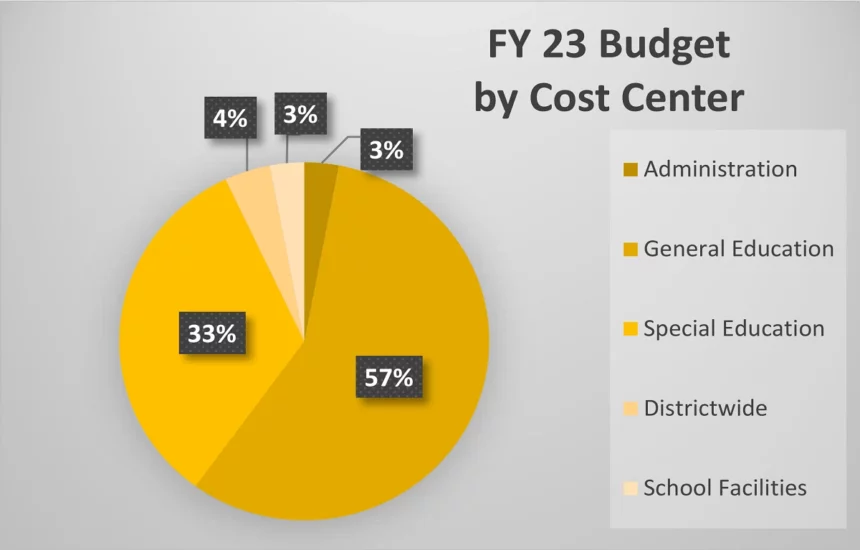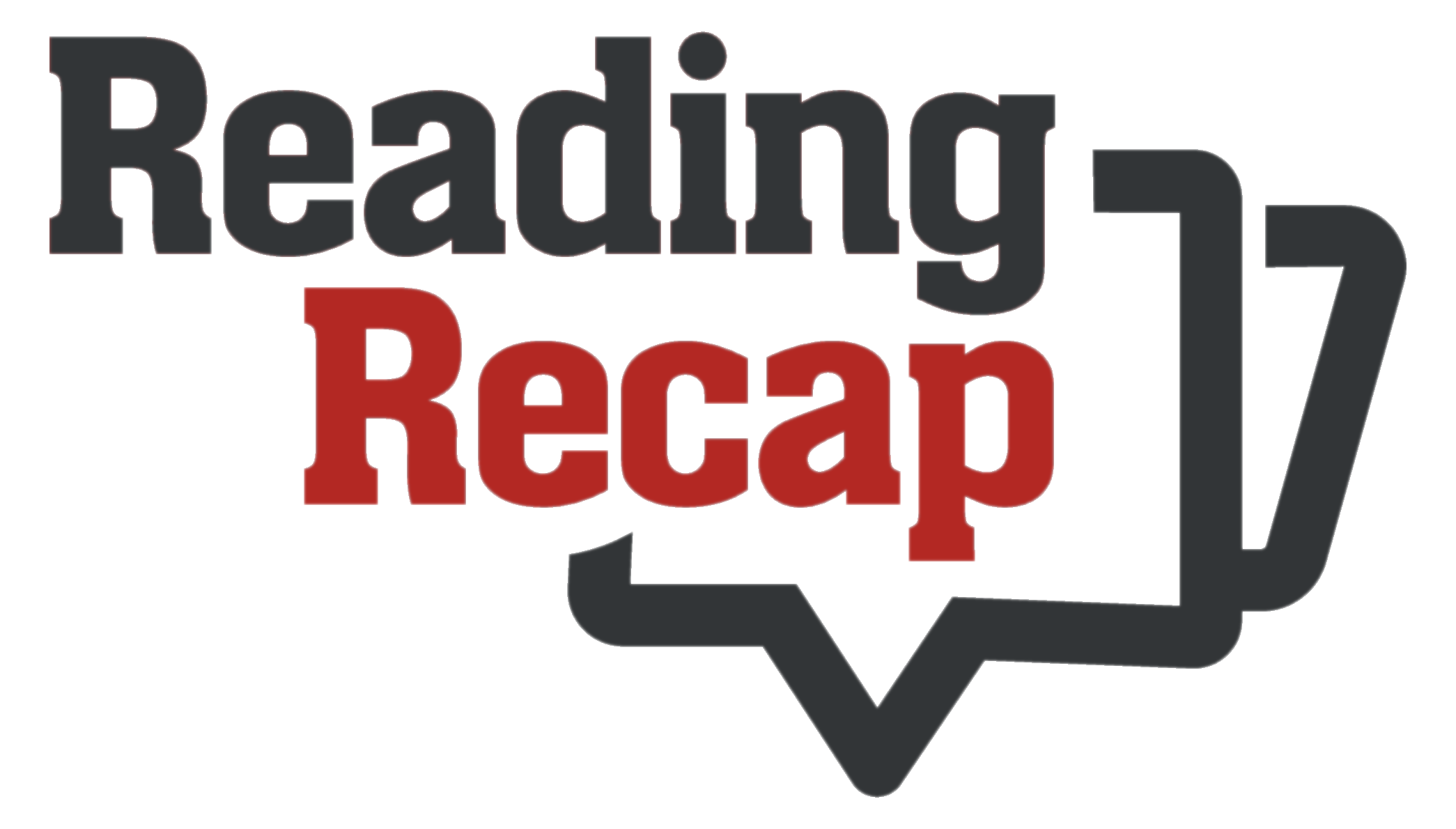The Reading School Committee (SC) met on 12/15/2022 and voted to approve the Reading Memorial High School (RMHS) School Improvement Plan (SIP), and also voted to approve several policies. The SC also heard a quarterly financial update and FY24 budget preview. In addition, the meeting included the announcement of the 2022-2023 Massachusetts Association of School Superintendents Certificate of Academic Excellence Recipients. More info below.
MASS Certificate of Academic Excellence
The meeting opened with the awarding of the 2022-2023 Massachusetts Association of School Superintendents Certificates of Academic Excellence (see related story here to RMSH seniors Brendan Manning and Abigail LeBovidge (see related story here). Each year, RMHS awards two certificates of excellence to two RMHS seniors whose academic record and record of academic and other accomplishments, stands out in the class of nearly 300 seniors, as being worthy of this prestigious recognition. The RMHS guidance department helps with selection of the recipients.
Public Comment
A parent spoke during public comment to note how their child, who is academically gifted, told that parent that they are finally being challenged by the RPS elementary literacy program, after years of being bored with the existing program, and the parent expressed gratitude for all who were involved in finding, funding, and bringing the new elementary literacy program to RPS, which has made such a difference in the child’s educational experience.
Reports
Finance Director Susan Bottan expressed gratitude to the technology team of RPS (Scott Mullen, Andy Strutt, Rob Bailey, A.J. Brussard, Chris Pedro, Mike Donahue, and network administrator Julien Carr) for all they are responsible for to help RPS systems and network work properly, including overseeing 4500 computer devices, 750 iPads and tablets, and 300 smart board panels, as well as all tech support, phones, clocks and bells systems, cloud based services, security systems, point of sale (POS) for food service, and supporting town and school department meetings.
Dr. Milaschewski noted to community that RPS is in need of substitute teachers and that RPS is paying “surge pay” of $125 a day for substitute teaching, for the next 6 days, due to the high number of illnesses in the school community. Dr. Milaschewski also took a moment to thank retiring Chronicle reporter Al Sylvia, indicating that this was Al’s last night covering the school committee, after covering the schools for ten years.
Chuck Robinson reported on a Hall of Fame dinner to induct new RPS alumnae athletes, and one inductee this year was Jim Queeney, who was not only a valedictorian in 2008 was captain of multiple RMHS sports teams, and also was a former school committee liaison, as an example of the type of well-rounded student that RMHS produces. Chuck also reported on the first Symonds Way Exploratory Committee, and noted Carlo Bacci was elected chair and Chuck was elected vice-chair. SWEC will next meet on 1/18/2023. Chuck also reported on the recent recreation committee meeting, and noted that the town Recreation department is partnering with Inclusive Sports of Peabody for future programs, probably in summer 2023, such as t-ball and other teams. In addition, Recreation is partnering with the Y to use ARPA money for bringing in adaptive swimming.
Tom Wise then gave reports on the policy subcommittee. He noted they reviewed multiple policies, tabling 4 and moving 3 forward for future discussion by the SC. He explained that over the rest of the year the policy subcommittee will review 48 more policies in their monthly meetings for the rest of the year. Tom also thanked support staff members Sue Brown, Dr. Mosier, Hollybeth Murphy, and Ms. Donovan, who helped and supported the students putting on the RMHS “Scrooge” performance. Tom Wise also noted the cameo appearances by Dr. Milaschewski, Principal Kevin Tracey, and Assistant Principal Kadi Buckley, with their cameo appearances.
SC Chair Shawn Brandt updated the SC on recent Select Board (SB) meetings, including updates by Sudeshna Chatterjee of the Reading Public Library, and noted that it might be possible to include Ms. Chatterjee on some of the RPS policy reviews. He also noted that there will be future single meeting review of RPS policies JICA, JB, and JFBB, in next SC meeting. Chair Brandt also noted that the SC had a public notice for a future meeting on January 5 regarding facilities naming, and he stated that there was a past nomination, but that nomination has been taken off the table, so as of the 12/15/2022 date of the SC meeting, chair Brandt does not anticipate reviewing any nominations on January 5, 2023, but if any pop up, they will hear it on January 3, 2023 and they would be on the agenda for that meeting. He then explained what the process would be should any nominations come in.
RMHS School Improvement Plan
Assistant Principal Kadi Buckley presented the RMHS School Improvement plan on behalf of Kevin Tracey, who Dr. Milaschewski indicated had become ill just that day. Ms. Buckley gave an overview of the school improvement plan, including its 4 key goals:
1. Foster a positive, professional, supportive, and collaborative school culture among staff, students, parents and community within which all have a sense of belonging.
2. Maintain a school-wide focus on equity; including, but not limited to a review of student academic, attendance and conduct data, student access to rigorous programs and opportunities, and support ongoing staff and student efforts to create a learning environment that is challenging, safe and welcoming for all.
3. Through a more consistent practice of instructional walkthroughs and feedback and professional development, focus our instructional work on creating learning environments and experiences that promote high levels of growth and achievement.
4. Create clear and transparent systems for operations and communication; including, but not limited to a review of our graduation pathways and policies for school attendance and credit recovery.
Ms. Buckley then went on to describe strategic objectives for each goal. The full RMHS school improvement plan can be found in the SC packet here at pages 14-20.
SC members then asked questions about aspects of the SIP.
Chair Brandt asked about a strategic objective relating to “incremental changes to the schedule” for 2023-24. Ms. Buckley explained that they cannot commit to anything now, and Dr. Milaschewski further elaborated that they are particularly looking at the current PE/Health sequence for grades 9 and 11, to see if they can be structured differently to avoid this structure in a way to have all PE back to back and all health back to back, possibly to free up a whole semester to enable gr. 9 and gr. 11 students to take an elective, possibly free up time in some of the innovation pathways, and also reduce the number of study halls that kids have. Thus, he continued, two core goals for incremental changes in the schedule are reducing the number of studies and increasing opportunities for students to have access to courses they want. This also will have to be balanced with other course requirements. Kadi Buckley added that another goal is to increase teacher planning time.
Tom Wise requested that the superintendent and assistant principal engage students and parent early in the process of considering changes, especially if the new schedule plan is to be rolled out in February 2023, because there has been no communication yet. He noted that failure to communicate can lead to no changes going through and another year of a bad schedule. Chair Brandt reminded the group that there was a microcosm of this process with what happened with the change in RMHS start times [changes in RMHS start times, from 7:30 to 8:30, were rolled out as a “done deal” back in winter 2018-19, with no community forums or parent meetings, and there was significant concern from RMHS parents].
Following the discussion, the SC approved the RMHS SIP by a vote of 5-0.
Q1 Financial Update
Susan Bottan presented the Q1 financial report, which summarized the school financials from 7/1/20200 through 9/30/2022. She explained the parts of the budget and how much was allocated to each, and gave a projected year end forecast for each of the cost centers (Administration, Regular Day, Special Education, Districtwide, and School Facilities). She noted that savings in regular day (which is primarily salaries) enabled accounting for other changes and expenses, including:
- Allowing the district to address a surge in enrollment of beginner multi-language learners by hiring 1.5 FTE MLL teachers.
- reallocating resources to make investments to accelerate learning by conducting ELA and math vacation academies this year for students in grades 2-8, as well as courses in SAT prep, College Essay writing, and Executive Functioning skills.
- Expanding the role of the grade 9-12 Academic Coordinator to a Director position, via sustained savings from salary differentials between incoming and outgoing staff, to focus on the new Academic Center at RMHS as well as develop Innovation Pathways for students supported by State grant funding and local business partnerships.
- Piloting, with success, a new daily wage rate for substitute teachers on days when there is an unusually high number of substitutes needed
For the Special Education cost center, Ms. Bottan noted that she projects positive end-year balance of $343,820, which reflects the use of three out of district tuitions budgeted to pay for potentially new placements and pre-payment of $980,000 in out of district tuition fees for the following year. In addition, Bottan noted $80k of savings resulted from replacing licensed staff with hourly staff, to eliminate MTRS expense. Additionally, delays in hiring licensed and hourly positions and unfilled substitute coverage for special education paraprofessionals created savings that have been reallocated to address a need at Joshua Eaton for a 1.0 FTE SPED LEAD Teacher to reduce large student groupings and at RISE for nursing services and an increase in the FTEs of the Director to 1.0 FTE.
For the School Facilities cost center, as noted in the packet, Bottan projected a yearend balance of $23,765, driven by salary savings generated through the salary differential between outgoing and incoming staff and delays in filling open positions.
Bottan noted in the packet that the Districtwide cost center is projected to end the year with a negative balance primarily due to a shortfall of ($40,736) in Health Services, because of unanticipated medical services to support student needs. Bottan recommended that the SC vote to transfer $40,736 from the Special Education cost center to the Districtwide cost center, to compensate for the shortfall. However, because the vote for the transfer was not posted in the agenda, the SC agreed to delay the transfer vote to its next meeting.
FY2024 Pre-Budget
Dr. Milsaschewski and Susan Bottan then went over the FY24 Pre Budget, including categories such as FY24 Finance Committee (FINCOM) Funding Guidelines, FY24 School Committee Budget Development Guidelines, the FY24 Budget Development Process, Approach, and Timeline, the FY23 Appropriated Budget Investments, and Strategic Objectives and FY24 Emerging Priorities.
In accordance with FINCOM guidelines, the FY24 budget would be slated to increase approximately 4.58% (approx. $2.37 mil increase) from FY23 levels, going from $51,783,363 to $54,156,623, both numbers including special education accommodated costs. This increase reflects a $150k community priority allocation to support movement towards universal full day kindergarten as well as a recent increase in the operating budget, identified by the town, in some of their budget development savings, and those dollars also will be used to help move toward universal full day kindergarten.
The following lists some (but not all) of the budget development guidelines are being used to formulate the FY24 school budget:
- Consider a plan to incorporate ESSER funded positions into operating budget
- Continue progress toward Universal Full Day Kindergarten
- Incorporate recommendations by DESE and Special Education Program Reviews
- Support RMHS Innovation Pathways
- Continue Middle School Curriculum Work
- Increase Time on Learning at elementary schools
- Support early learners and readers
- Hold onto Merrimack and Endicott Elementary Teaching fellows
- Examine staffing schedules
- Maintain class size within School Committee Guidelines
Bottan explained that the baseline budget is designed to comply with contracts and legal mandates guided by projected enrollment, class sizes, and student needs. According to a chart Bottan presented, the projected enrollment for FY24 is 3808 students, which is a drop from the current FY23 enrollment of 3851 students, with the biggest drops being seen in middle school and also in the cohort going from gr. 8 this year to gr. 9 next year (drop of 36 students). Tom Wise noted that normally, RPS sees approximately a drop of 10% of students in the cohort going from gr. 5 to gr. 6, and Bottan’s projection showed an increase of 1 student, and asked her to explain this difference. Bottan responded that in recent years, the number has been different (two years ago, 5% decrease, this year, 3% increase). Bottan noted that there is still the consistent 11% drop from 8th to 9th.
Bottan then explained some ways that RPS is trying to maximize resource, both in personnel and non-personnel expenditures. For example, salaries of lunch paras will be charged to the school lunch fund, and shift positions will be charged to a Federal grant to save MTRS expense. In addition, RPS is reducing the new employee physical examination requirement. However, Tom Wise noted that the physical examination requirement is, in fact, a Reading bylaw issue (article 4 of the town bylaws mandates a physical examination of every new employee) as well as in RPS and that SC members may need to advocate for this change in the future, including asking the town bylaw committee to take a look at that requirement. Chair Brandt asked whether the change in bylaw on physicals needs to be brought to April town meeting, and Tom Wise answered that the thought may be evolving on how best to do it, but was not clear whether it could be done by April town meeting, but November 2023 town meeting would be more reasonable.
Chuck Robinson asked, how is the budget making assumptions for inflation? Bottan replied that they are reviewing trends and factoring in an inflation factor based on the type of product or service, instead of applying the same overall inflation factor to all costs.
Following the budget preview, Dr. Milaschewski gave some reflections and assessments on FY23 that have resulted in over 30 emerging priorities for FY24 that may not yet be in the budget, but which may be emerging investment priorities, including but not limited to:
- Increase access to full day kindergarten (FDK) by reducing tuition fee and eliminating fee for high needs population
- Maintain elementary METCO/Adjustment counselors and expand model to secondary schools
- Embed ESSER funded guidance and team chair positions
- Sustain SPED program evaluator position
- Expand translation services to support the registration of multi-lingual learner (MLL) students and communication with families
- Hire transition coordinator and expand role of team chairs, to support vertical alignment of curriculum and services for special education program
- Add RISE 0.40 FTE teacher
- Add student need-driven 1.0 FTE nurse
- Add social worker at middle schools
- Coordinate attendance and registration system with responsive supports
- More investments in restorative circles, social justice, and social emotional learning curriculum
- Build on project wayfinder curriculum at RMHS
- Increasing efforts in DEI programs
- Increase attendance by contracting for one additional school bus
- Hire and deploy instructional ELA/Reading and Math coaches and interventionists at elementary and secondary levels
- Focus support to instructional leadership through adoption of full-time elementary assistant principal positions
- Sustain ESSER funded sped teacher, counselors, and team chair positions
- Continue support of RMHS Innovation Pathways
- Maintain elementary teaching fellows
- Developing a multi-year curriculum review cycle
- Extend mentorship program for 2nd year teachers
- Increase Health/PE staffing and refine Wellness units of study
- Expand Seal of Biliteracy assessment at high school
- Support participation of World Language teachers through professional development institutes
- Need for additional MLL instructional supports
- Increase instructional staff in RMHS academic lab
- Increase MCAS and RMHS testing stipends
- Expand assessment tools to analyze student performance through the license of a data warehouse to synthesize disparate data sources
- Add support to technology staffing to support growth within district and responsive services to staff and students
- Support care and cleaning of school buildings through increased custodial services during after hour use
Dr. Milaschewski indicated that this list would be narrowed down by January 5, 2023, when the Superintendent will present a recommended FY24 budge.
The SC then discussed the budget proposals. Erin Gaffen asked for clarification about the statement “maintain teaching fellows,” noting that currently the 4th grade is already large and is going to be even larger next year. She noted that the teaching fellows have been a great support for the 4th grade programs, but wondered whether the current teaching fellows will follow the current 4th grade into 5th grade, to accompany the large grade 4 that we hired them for, or will there be another issue in 4th grade next year, such that we need even more teaching fellows, or will the existing teaching fellows stay with 4th grade? Dr. Milaschewski indicated that they do not have an answer yet, but noted that it would be hard to pull away the support that the larger cohorts have had, but also that he has to be sure that cohorts that grow in size get the support that they need. He also noted that it was difficult to hire fellows even for the current year. He added that Reading is now part of an agreement where it will be one of six “priority districts” for Endicott fellows, and that Merrimack thinks it fellows pool will be larger than in the past, but there is always a risk in budgeting for fellows.
Chair Brandt also noted that he, like Erin Gaffen, has a child in 4th grade in a class that is at the higher end of the recommended class size, and that he agrees with Erin’s comments.
Tom Wise followed up with the discussion on class sizes, noting that he really wanted to see the school breakdowns and not just overall class size per grade. He also added, he wants to know, are the fellows working like we hoped it would? Dr. Milaschewski responded that the fellows themselves feel that they are a good resource for classes, but that RPS only has positive anecdotal information vs data and metrics about the benefit of the fellows. He noted that the follows have at times led group instruction, served as substitute teachers, helped teachers with planning, helped with one on one interventions, helped with socio-emotional supports, helped at lunch and recess, etc. Tom Wise followed up that, RPS effectively has a randomized control trial with the fellows, because we can compare growth of students/schools who have fellows vs students/schools who do not have fellows, as well as fellows vs. paras.
Erin Gaffen added that the school adjustment counselors have been a huge add that is making a genuine difference in the schools.
Tom Wise asked, are we looking for both ELA and math coaches or just math coaches, because he wondered whether we need ELA coaches for a time in future when ARC steps away? Dr. Milaschewski clarified that, we need to have a sustainable model for when ARC shifts, but it is not an immediate high priority.
Tom Wise also asked about emerging goal relating to sustainability of the 1:1 device initiative, and do we anticipate a large sustaining purchase of devices in the next year? Ms. Bottan replied that this would be addressed in January, and that one goal is to equalize the number of purchases each year, and also that they are investigating leasing vs buying, for device.
January 5, 2023 and January 9, 2023 are slated to be the budget overview meetings when the actual proposed FY24 RPS budget will be presented formally to the SC. The public hearing on the FY24 proposed school budget will be January 19, 2023. The SC vote on the budget will be January 26, 2023.
After the budget discussion, the SC moved into executive session from approximately 8:33pm until 8:59 pm.
Policy Discussions & Votes
The SC then got through a number of polices. First, they begin with a Second Reading of Policy JE – “Student Attendance”. After voting 5-0 to waive the reading, the SC voted 5-0 to adopt policy JE.
Second, the SC considered a Second Reading of Policy JH – “Student Absences and Excuses”. After voting 5-0 to waive the reading, the SC voted 5-0 to adopt policy JH.
Third the SC considered a Second Reading of Policy JFABD – “Homeless Students: Enrollment Rights and Services”. After voting 5-0 to waive the reading, the SC voted 5-0 to adopt policy JFABD. Tom Wise also added that this policy included changes in language relating to “parent/guardian”.
Fourth, the SC considered a Second Reading of Policy EFDA – “Unpaid Meal Charge Policy” 9:15 p.m. After voting 5-0 to waive the reading, the SC discussed this policy, including amending the policy with clarifications on whether and how the policy includes notifications to parents for issues such as whether a student has a negative balance and whether a student is eligible for a free/reduced meal if the student has unpaid meal debt. After the discussion, the SC voted 5-0 to adopt policy EFDA as amended.
After the second readings, Tom Wise gave a prelude to the next four policies subject to a first reading. Tom indicated that the policy subcommittee built a catalog of 48-49 policies to attack throughout the year. He indicated that the 4 policies listed for first reading that night were “new” to the RPS policy manual, meaning that they are not part of it at present. He said some result from recent legislation and some result from the Massachusetts Association of School Committee (MASC) review of its own policy manual. He noted the two new polices under section DE are related to financial review updates MASC has done, policy JICK is related to the most recent articles of 2022 with regards to protections for hair, and GCF is one that we do not currently have. The policies for first reading are Policy DEC – “Federal Funds Supplement Not Supplant Policy”; Policy DKC – “Expense Reimbursements”; Policy GCF – “Professional Staff Hiring”; and Policy JICK – “Harassment of Students”. The SC discussed the policies, and chair Brandt suggested that Sudeshna Chatterjee might take a review of policy JICK for any insights or suggestions she might have. Several SC members wanted to ensure that policy terms in policy JICK are broad enough to cover many types of social media and other applications in use today and in the future by RPS students.
The SC adjourned at approximately 9:35 pm.










